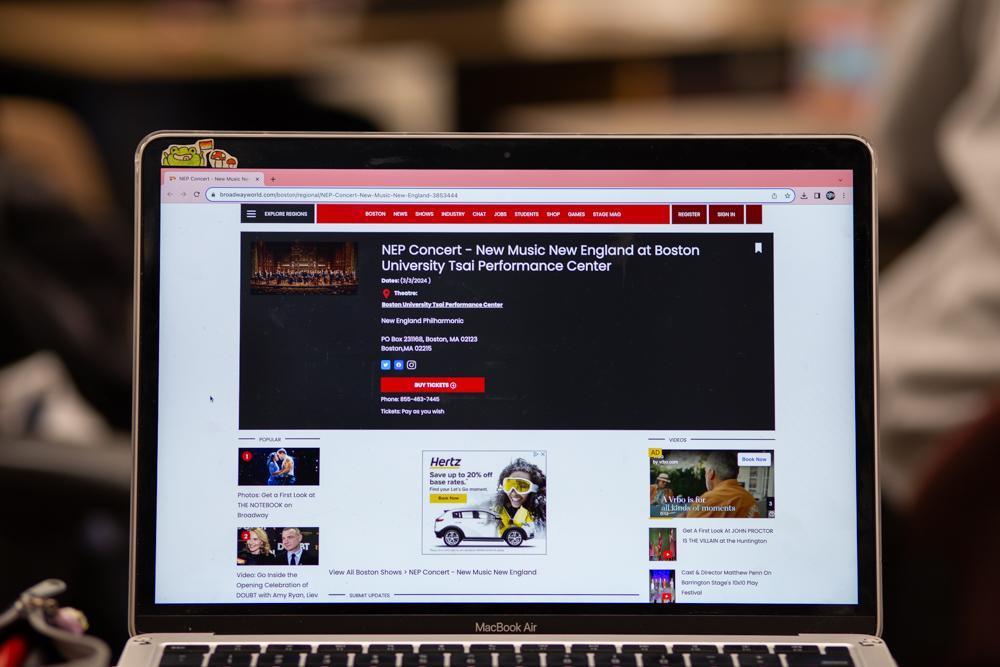The violins whined, the trumpets groaned and the electric harpsichord twinkled. With delicate flicks of his baton in upwards, downwards and circular motions, the conductor controlled the orchestra. A musician at the back of the stage struck a drum, inviting a jolting sound, but the disruption is a choreographed aspect of the piece.
The symphony marked the launch of New England Philharmonic’s newest initiative, New Music New England, at Boston University’s Tsai Performance Center on March 3.
The concert featured five orchestral pieces and is the first of what will be an annual performance that aims to spotlight New England composers by curating performances of their work. This year’s inaugural show highlighted composer and advisory board member John Harbison, in celebration of his 85th birthday.
At the helm of Sunday’s symphony was the New England Philharmonic’s Music Director, Tianhui Ng. Ng said New Music New England is a means to amplify contemporary classical pieces despite the challenges of organizing an orchestra.
“The orchestra is such a magnificent instrument. It is really difficult to put all the resources together to make it happen, and so it’s really special to be able to do this,” Ng said. “Given our platform, I wanted to make sure that we provided a space for everybody to share their music.”
The New England Philharmonic, established in 1976, consists entirely of volunteer musicians. The orchestra performs current and past works to promote appreciation for modern classical music.
Initiatives like New Music New England also brings together music-lovers across New England.
“You rarely see people from Harvard from MIT from NEC all coming together,” Ng said.
The inaugural performance began with the local premiere of Wang Lu’s “Surge.” Lu cited her desire to redefine the word “surge” as her inspiration for the composition. She said the word took on a negative meaning as the world exited the pandemic, so she wanted her music to give it a new connotation: momentum.
The next piece was Charles Ives’ composition, “Three Places in New England.” The song consisted of three parts, each named after a specific New England setting: The “St. Gaudens” in Boston Common, Putnam’s Camp, in Redding, Connecticut and the Housatonic at Stockbridge.
Although “Three Places in New England” was the only composition that wasn’t from this century, Ng said he views the piece as relevant to the concert due to its experimental nature.
“That spirit is alive today,” he said of the composition. “I was wanting to make that connection and to also create a sense of community around all the music that we’re making.”
Karen Maloney — a member of the Heritage Chorale in Framingham, Massachusetts which has sung Ives’ work — attended the concert to see a friend play cello. She said she particularly appreciated the second part of the composition because she was “recognizing so much of the similarity and tone and playfulness.”
Maloney said what she enjoyed most about the concert was that it exposed her to classical works she had never heard before.
“When I come here, I get a whole variety of new works that I would never on my own come across,” she said.
Other rendered compositions included David Sanford’s “Thy Book of Toil” and Kati Agócs’ “Perpetual Summer.”
To culminate the concert, Grammy Award-winning organist Paul Jacobs played John Harbison’s “What Do We Make of Bach?” Harbison, who also wrote a book by the same title, explored the impact of personal interests on identity as a theme.
Contrary to classical music’s reputation, Ng said he believes classical music is more relatable to the average person than most mainstream music, especially due to its human aspect.
“Classical music, even though it’s seen as elitist nowadays, is much more often the music of the people,” he said. “These are people playing, as opposed to some unapproachable thing …You’re here in a community orchestra.”
Sweta Swaminachan, a scientist working in the biotech industry, attended Sunday’s concert to watch her friend and the Philharmonic’s music librarian, violinist Rossana Chung. For Swaminachan, “Three Places in New England” was the highlight of the concert.
“It was a very different experience,” she said. “I’m used to classical music, but this was so unique, almost unexpected. You just don’t know what’s coming next.”
Above all, Ng said the importance of New Music New England is to create a platform for everyone to share their music.
“Every generation deserves to have its voice heard,” Ng said. “And this is [a] crucial place, a special place for the music of our time to be heard in its grandest possible [way].”

























































































































Tim Alexander • Mar 18, 2024 at 10:18 am
I like that you included the reactions of members of our audience, and mentioned their reason for coming!